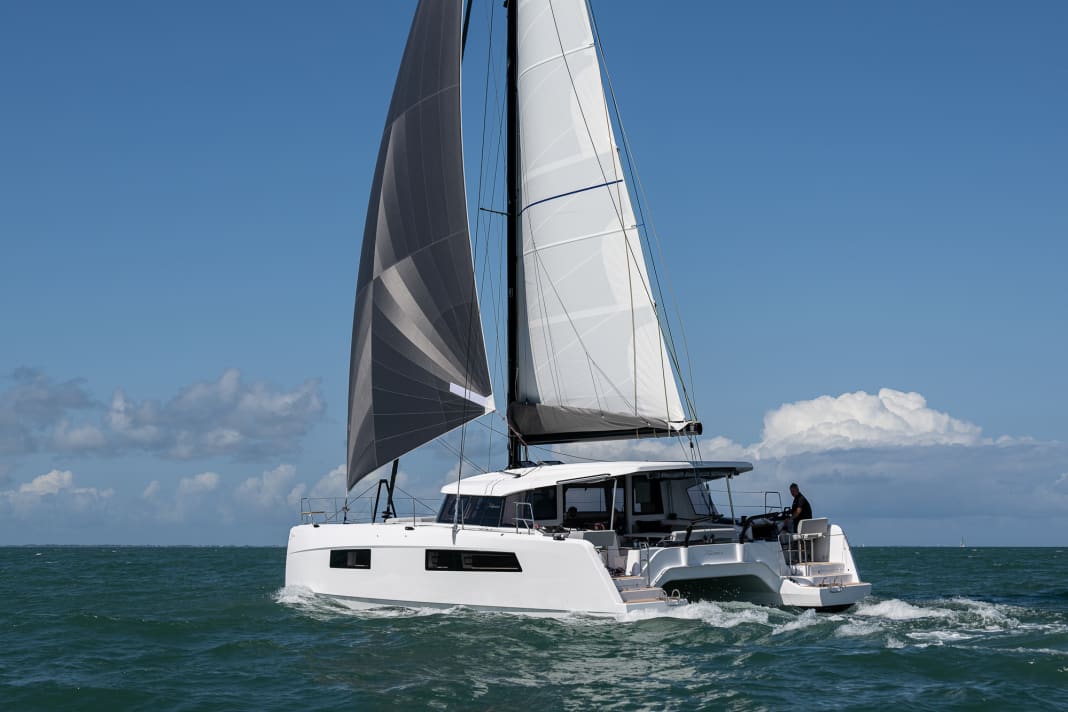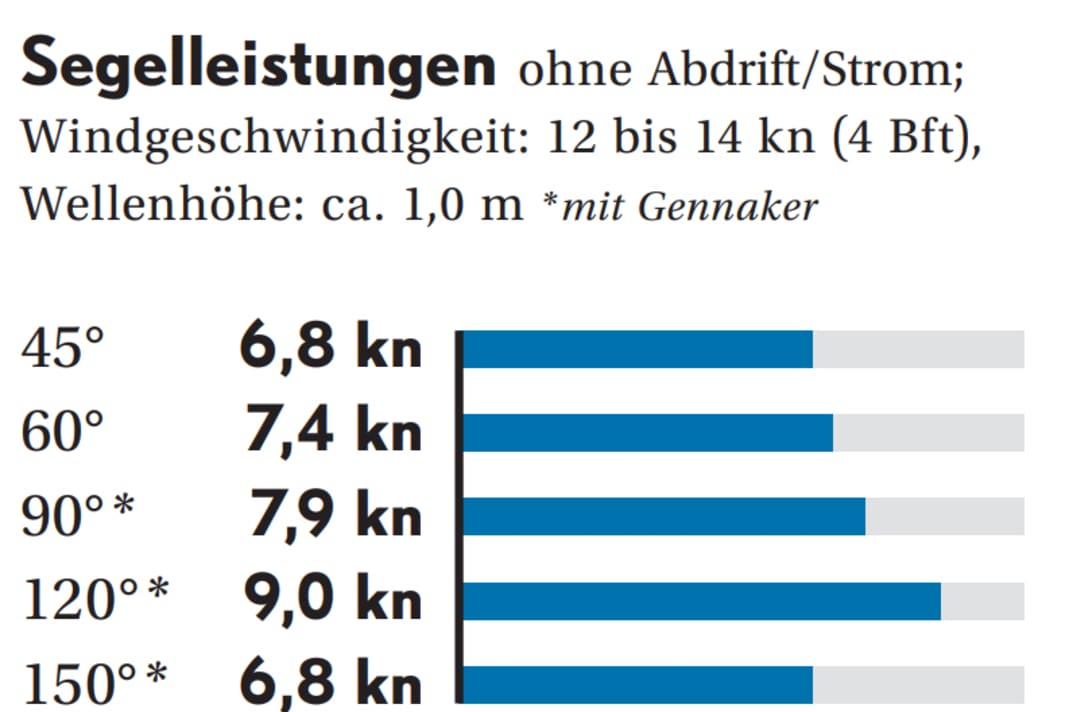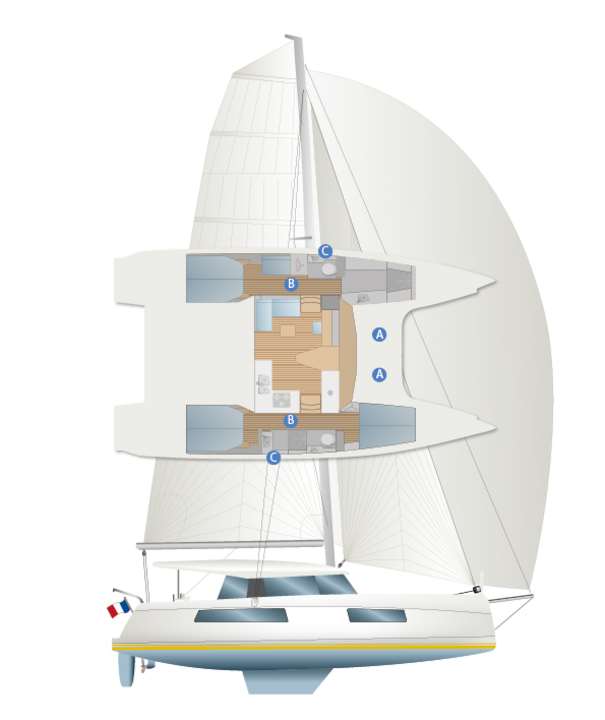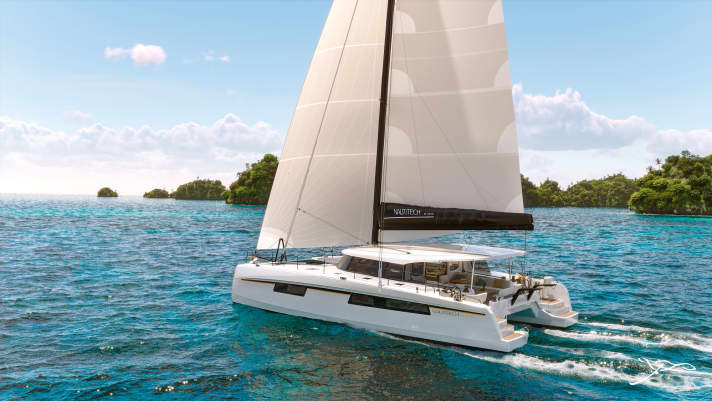





In this article:
Large cruising catamarans are not known for releasing large amounts of happiness hormones in ambitious and sporty sailors. As far as sailing characteristics are concerned, the full-bodied twin-hulls are generally regarded as rather cumbersome, less dynamic and undemanding. On the other hand, they offer fundamental advantages in terms of space and cosiness, which monohulls cannot match. The arguments in favour of and against catamarans are well known.
Of course, this does not apply to all cruising catamarans per se. Some boats have a more balanced overall balance. A current example of a particularly harmonious compromise between performance, pleasing sailing characteristics and comfort on board is the new 44 Open from Nautitech in France. The ship from the shipyard in Rochefort on the French Atlantic coast, which belongs to Bavaria Yachtbau, has now been honoured with the title of European Yacht of the Year 2023 in the multihull category. The decision of the international jury with representatives from the twelve leading yachting magazines in Europe was virtually undisputed, despite extremely strong and attractive competition with no fewer than six catamarans nominated for this year's award.
Nautitech 44 Open has strong sailing characteristics
The Nautitech receives praise above all for its strong sailing characteristics. The conditions are ideal for the YACHT test off La Rochelle. The wind was blowing between 12 and 15 knots, i.e. 4 Beaufort. At first, Marc Lombard's design surprises with its good performance upwind and, above all, its impressive height. The bipod runs at 6.8 knots upwind at an angle of 45 degrees to the true wind, without having to pinch. For a catamaran, these are remarkably good performance figures. All the more so as these are achieved with the standard sails, i.e. with the conventional fully battened mainsail and the relatively small self-tacking jib.
However, if you drop onto a room sheet course, the rather modest sail plan quickly runs out of energy and the performance values drop. From a wind angle of 60 degrees, a code zero or, optionally, a gennaker provides sufficient power and speed. At least one of these additional sails is essential for deep courses. As an alternative to the small self-tacking jib and for an additional performance boost in light wind areas, the shipyard can also supply the boat with an overlapping genoa and hoisting points on the coachroof. A higher carbon fibre mast with more sail area is also on the list of options.
Catamaran manoeuvrable and easier to turn
Typical for Nautitech are two steering wheels, which are mounted far aft and recessed with a step to the running deck. At the wheels, the helmsman stands at the very back almost at the level of the stern platforms. However, the helmsmen are very well protected at the steering positions and work in complete safety, even in rough weather. And contrary to what one might expect, the view forwards and into the sails is perfect, also because the helmsman can switch from windward to leeward at will. The steering works flawlessly and the ship is particularly pleasing in manoeuvres with a high degree of agility. Compared to many other catamarans, the 44 Open is extremely manoeuvrable, which helps the boat to tack noticeably quickly.
With a weight of 10.9 tonnes, the relatively light catamaran also reacts quickly and immediately to steering movements. What's more, the helmsman can even feel a slight rudder pressure on the wind, which makes it easy for him to steer the catamaran with a lot of feeling and pleasure in the wind. This is also due to the steering system. Both wheels and both quadrants are connected to each other with a single, continuous wire cable, not with a long push rod as is usually the case with catamarans. Although this makes the system very smooth-running, it lacks redundancy in the event of a fault.
Shines with sea behaviour
In moderately high swell, the 44 Open also shines with its excellent seakeeping behaviour. The noticeably stiff and low-torsion structure settles well into the waves and shows less of the unpleasant rolling movements that are familiar from catamarans. This is also due to the shape of the already comparatively slender hulls, which taper significantly towards the waterline with the strongly stepped chine edges.
All halyards, sheets and trim lines are elegantly routed over the roof and side decks directly to the helm stations. This means that the Nautitech is also consistently suitable for single-handed sailing. The mainsheet and the traveller on the aft beam, which is particularly important for catamarans, can be operated easily and at an ergonomically good working height via the winch. Incidentally, electric drives are also available for all four winches.
Incidentally, the quality and size of the fittings on deck are flawless right from the shipyard. Because the loads on the sheets and halyards are relatively high, it is definitely worth fitting Dyneema lines, which are available as an extra in the package, to ensure efficient trimming.
Hulls of the Nautitech cats built as a GRP sandwich construction
Nautitech builds the decks and hulls of its cats as GRP sandwich constructions using a complex vacuum infusion process. The keels are firmly glued into corresponding recesses in the hull. The fins are strong enough that the boat can be parked on them without any problems, even if it falls dry. Unlike many comparably sized catamarans, the rudder blades on the Nautitech 44 Open are installed far aft behind the saildrives. This improves the response behaviour when manoeuvring in confined spaces in the harbour. Incidentally, both helm stations can be equipped with motor control levers so that the helmsman can manoeuvre from both sides with a good overview.
The two aft steering pillars also have the advantage that the main boom can be attached relatively close to the coachroof. This is good for performance under sail, but also for handling when hoisting the mainsail into the lazy bags. This work on the roof is easy to carry out at a good height, and there is no need for daring climbs up the mast, such as on catamarans with a flybridge.
Name suffix "Open" stands for space utilisation
The name suffix Open stands for the type of space utilisation that Nautitech Catamarans introduced as an innovative new feature back in 2014 with the smallest model in the range, the 40 Open. The idea: the saloon as a living area is generally somewhat smaller and is essentially reduced to the galley and navigation areas. This benefits the fully covered exterior cockpit, which is therefore more spacious and, with a large seating area and dining table, becomes a kind of open saloon extension. The interior and exterior areas are also functionally linked by the wide-opening sliding glass doors.
The open concept has caught on. In the meantime, other manufacturers of cruising catamarans have also adapted the same idea for their models. In this respect, the open concept on Nautitech boats is no longer a unique selling point for the brand, but rather corresponds to the standard for catamarans. With the flexible side panels attached to the bimini, the external cockpit on Nautitech boats can also be completely closed and the space additionally heated if required. The shipyard offers this convenience as an option for use in northern waters.
Salon des Nautitech 44 Open
A special feature of the new 44 Open is the centrally mounted bar table in the saloon, which is just as suitable as a bar for morning coffee as it is for a joint route briefing with the crew. It also serves as a room divider between the huge galley on the starboard side and the navigation area on the port side. In addition, the living area in the saloon is complemented by a small seating group, where you can sit down when you're underway, protected from the sun and wind, without losing contact with the cockpit. The table of the seating group can be lowered and the area closed with inlay cushions. This means that the area can also be used as a bunk for the free watch on long trips.
What is definitely missing in the saloon, however, are usable handrails or recessed grips. Especially on catamarans with their open and spacious layout, good handholds are indispensable in rough weather and swell.
Nautitech is planning the usual class variants with three (owner's version) or four cabins (charter) in the hulls of the 44 Open. However, there are only two heads in both versions, with the toilet room being separate in each case. The majority of cruising catamarans in the same length segment already offer greater comfort in this respect with a separate bathroom for each cabin.
Cabin can be extended to be multifunctional
As a further attractive conversion option for owners, the forward cabin in the starboard hull can also be converted into an open space without a berth for multifunctional use as a workshop, washroom or walk-in changing room. The shipyard calls the additional space a "smart room" and is flexible in terms of the expansion options depending on requirements.
The berths in the cabins are wide enough for double use, but the berths are also quite short at 1.95 metres aft and 1.93 metres forward, without any obvious need. On the other hand, the 44 Open impresses with its many easily accessible and cleverly organised storage spaces on and below deck. What's more, the ventilation options in the saloon as well as in the cabins and wet areas are impeccable.
The diesel tanks for the two engines, each with a capacity of 300 litres, are made of aluminium and rest in a good position deep in the hulls under the floorboards. Two PVC tanks for fresh water, also with a capacity of 300 litres each, are integrated into the front platform. This means that Nautitech offers larger filling volumes than many competitor boats right from the shipyard. This is an important issue for long journeys.





Prices at Nautitech
Finally, let's take a look at the prices. The basic version of the 44 Open costs 687,000 euros as an owner's version with three cabins and a fairly extensive range of equipment. At first glance, Nautitech's rather self-confident pricing policy in comparison with the competition is put into perspective by the high standards of the technical installations and the high quality of the add-on parts. The shipyard's boats are not only very solidly built, but also impress with their beautiful, impeccably finished interiors.
The design of the Nautitech 44 Open makes compromises that other cruising catamarans find difficult to match. The considerable increase in sportiness and performance are convincing arguments in favour of accepting minor compromises in terms of cosiness and comfort in return. Overall, the boat is therefore well-rounded, well thought-out and very well adapted to the contemporary demands of cruising sailors.
The ship certainly deserves the title of European Yacht of the Year 2023 - in every respect.
Michael Good
The Nautitech 44 Open in detail

Technical data
- CE design category: A
- Torso length: 13,30 m
- Waterline length: 13,02 m
- Width: 7,36 m
- Depth: 1,44 m
- Mast height above WL: 21,4 m
- Theoretical torso speed: 8.8 kn
- Weight:10,9 t
- Mainsail: 72,50 m²
- Self-tacking jib: 33,60 m²
- Machines (Volvo): 2x 29 kW/39 hp
- Fuel tanks (aluminium): 2x 300 litres
- Fresh water tanks (PVC): 2x 300 litres
- Holding tanks: 2x 54 litres
Versions for owners and for charter
The boat is usually available as a three-cabin version with a large owner's area (see illustration) or with a symmetrical layout and four cabins for charter use. However, there are still two toilet rooms in both versions
- Lots of main, little jib:The rig is positioned far forward on the coachroof. The standard self-tacking jib is therefore quite small. There are variants
- Sporty touch:Because the helm stations are mounted aft on deck, the main boom can be set low. This has many advantages
- Efficient fins: The rudder blades are relatively large and therefore effective. They are installed behind the saildrives
- Strong network: The keels are inserted into the hull recesses. They are firmly glued in place. You can park the boat on them
Equipment and prices
- Base price ex shipyard: 687.340 €
- Standard equipment included: Sail, engine, sheets, railing, navigation lights, battery, compass, sails, cushions, galley/cooker, bilge pump, toilet, anchor with chain, fire extinguisher, electric cooler, holding tank with suction system
- For an extra charge: Sailcloth € 1,890, antifouling € 6,430, clear sailing handover € 11,740
- Price ready to sail* : 707.400 €
- Guarantee/against osmosis: 2/5 years
Prices as of 03/2023
- * how the prices shown are defined can be found here !
Surcharge for comfort equipment
- Line adjustment Hole points: n. erhl.
- Traveller with line guide: incl.
- Electric windlass: Comfort package
- Spring cleats: incl.
- Teak in the cockpit: € 16,540
- VHF radio: Nav package
- Logger and echo sounder: Nav-Package
- Wind measuring system: Nav-Package
- Autopilot: Nav package
- Nav package: 19,030
- Charger: Comfort package
- Shore connection: Comfort package
- 230-volt socket outlet: Comfort package
- 12-volt socket in the sat nav: incl.
- Heating: € 25,865
- Pressurised water system: incl.
- Hot water boiler: incl.
- Shower WC room: incl.
- Cockpit shower: Comfort package
- Comfort package: 35,460
- Comfort price 2: € 804,295
The Comfort package also includes davits, mooring kit (fenders, mooring lines), electrical upgrade with five 140 Ah AGM service batteries, USB connections in all living areas, Delta anchors, mosquito nets for the hatches, Fusion audio system, GRP cockpit table
Hull and deck construction
- Hull and deck GRP sandwich with foam core, built using the vacuum infusion process
- Interior fittings are manufactured in modular design and subsequently installed
- Keel stubs are glued in
Rig
- Standard is an aluminium rig with two spreaders from manufacturer VMG Soromap (France)
- A slightly higher carbon fibre rig is available as an option (price on request)
Sail
- Simple Dacron sail set with battened mainsail and self-tacking jib in basic configuration
- An overlapping genoa (53.0 m2) available on request
- Surcharge for performance sails (Hydranet) from 17,600 euros gross
Motorisation
- 2x Volvo Penta D2-40 (40 hp) with Saildrive as standard
- Optional Volvo Penta 2x D2-50 (50 hp) for an extra charge: 6,870 euros
Standard batteries
- Service: 1x 120 Ah AGM
- Motors: 2x 90 Ah AGM
Shipyard
- Nautitech Catamarans, Rochefort: www.nautitechcatamarans.com
Distribution
YACHT rating
Sophisticated, coherent concept for a cruising catamaran with plenty of sportiness and performance. The Nautitech 44 Open particularly impresses with its excellent sailing characteristics. But cosiness is also a high priority
Design and concept
- + Balanced compromise
- + High-quality, solid construction
- + Fairly calculated price
- - Only two wet rooms possible
Sailing performance and trim
- + Good speed, good height
- + Lively sailing characteristics
- + Very efficient traveller
- + Suitable for one-handed handling
Living and finishing quality
- + Impeccable fit-out standard
- + Smart room as an expansion option
- - Berths generally quite short
- - Hardly any holding options
Equipment and technology
- + Substantial tank capacities
- + High-quality deck fittings
- + Perfectly harmonised controls
- - Control system not redundant
This is the competition: travelling in comfort on a sporty basis





Same concept, one size bigger

The next new construction project of the catamaran builders in Rochefort will be the new flagship, the Nautitech 48 Open. Compared to the 44 Open, the general concept and layouts remain almost unchanged, as do the look and construction. However, the approximately 1.30 metre longer hulls provide more space for two significantly more spacious wet cells, each with a separate shower area. In addition, the larger ship can also be fitted with a smart room.

